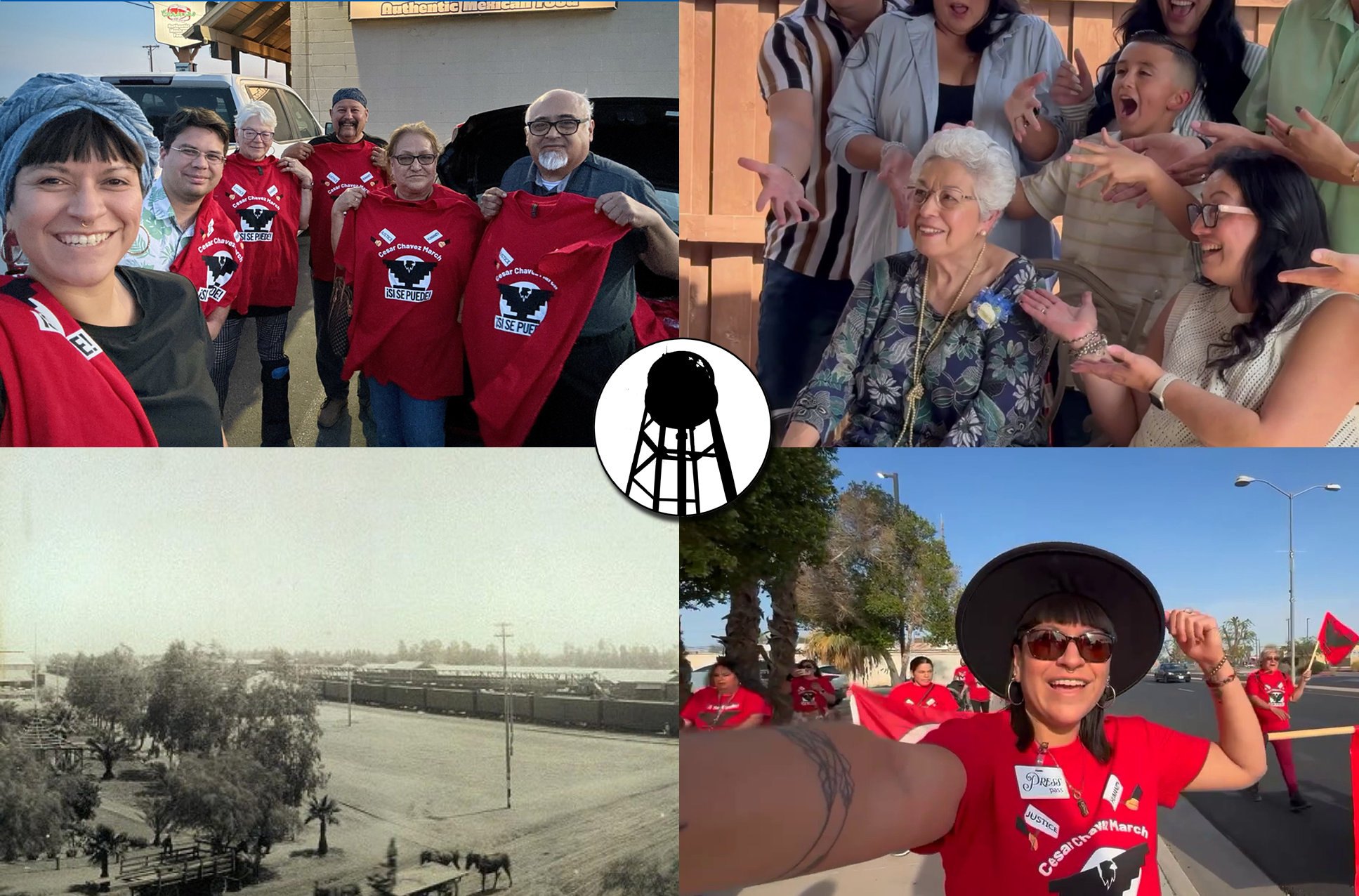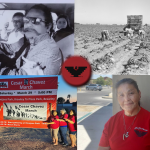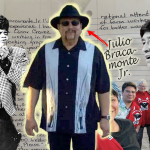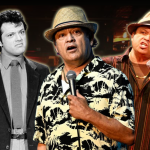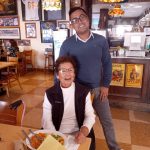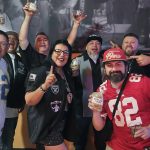At this point, this story is about so much more than César Chávez—but for chronology’s sake let’s take this story back to March of this year.
People’s Press was fresh off a Mid-winter Fair & Fiesta induced frenzy and I was already knee-deep in things I hadn’t done by the time the César Chávez event came around. Initially, I saw this time lag as a negative (even though we are a Slow News publication) but I know in my bones that things have a way of working out perfectly when you are following your true life path.
My association with the César Chávez March Committee (CCMC) began in late February with a text message from longtime family friend, Ceci Gastelo. We had a habit of running into each other at all kinds of events and city council meetings, me often while on the job as a journalist and her while just being the busy bee volunteer that she is. For a couple of years now, she’s seen me galavanting all around the valley talking about how “I’m gonna change the world” or “I’m on a mission” (and serving one-of-a-kind looks while doing it). But this is nothing new to a woman who has known and fed me since my barefoot band geek days at BUHS. So I’m glad she thought to invite me last minute to sit in on a CCMC meeting at Las Chabela’s Restaurant in Brawley, not knowing what I would show up wearing or what awkward thing I might say. Brave.
To prepare for this first encounter, I started listening to an audiobook called “The Union of their Dreams: Power, Hope, and Struggle in César Chávez’s Farm Worker Movement” by Miriam Pawel in order to brush up on my Chicano history. Until that moment, I think the last thing I remember learning about my own culture’s history came from John Leguizamo’s 2018 stand-up comedy called Latin History for Morons, which I watch maybe every couple of years to remind myself that even though Latinos have had our art, books, and literal gold stolen, despite our men, women, and children having been raped, enslaved, and indoctrinated, and regardless of the fact that our sacred lands have been ransacked, looted, and sold back to us…

To be born brown in a border town–and not be Catholic or fluent in Spanish–brings with it a whole new set of nuances. There seems to be this underlying buzz of anxiety that even I as a natural born citizen of the United States feel the closer you get to the wall. Especially now. But at the time, none of this ICE shit had happened. So going to the committee meeting felt important, but not critical. In the end, I’m glad I went.
I was the youngest person at that table by a longshot (no hate–those are OGs) and I’m not sure any of the other members were expecting me. They welcomed me into the group and I nibbled on chips and salsa because I wasn’t sure if someone was going to pick up the tab and I didn’t have enough for a meal. I told my long-distance neighbors and newfound familia about People’s Press, and what it is I’m trying to do here in Imperial Valley. It was cool, and they seemed interested in my passionate rhetoric and dedication to the working class. Clearly, I was in the right place.
I left Chabela’s that night with a whole new perspective on the fight for farmworker’s rights. It made the things I heard in my audiobook that much more real. I heard from families who knew César Chávez personally or had had encounters with his movement back in the day, and others who descended from generations of farmworkers and just wanted to honor their legacy. Looking back, I’m not sure I initially included myself in this cohort, but this is true even for me. My own father worked in the fields picking lettuce and tomatoes as young as 9 years old, and his father was a picker and a mayordomo for over 30 years. Heck, on my mother’s side my grandfather was a foreman too. And now that I think about it, working in the fields was where he met my grandmother. And this perfectly illustrates one of the reasons I set out to create this Citizen Journalism platform for the everyday person to document their experiences in their own words. Because if we stop telling our stories…

In fact, that was some of what was discussed at that meeting; that our youth are not involved in the cause, and frankly do not care. Someone even suggested offering free tacos to bait the Imperial Valley College (IVC) Chicano Studies students to come to the march. I couldn’t help but feel some kinda way about that. Some of the CCMC members at that table were in their late 70s or were straight up disabled. Honestly, I was impressed by their commitment to march at all. I left feeling inspired and told them I’d bring another journalist with me to the next meeting. At People’s Press, we like to have multiple perspectives on any one event in order to offer the community a chance to compare personal truths and come to their own multidimensional conclusions. Mainstream journalism offers a limited worldview, and can be very authoritarian that way.
I got home, took the beans off the slow cooker, put that audiobook back on, and got to prepping a big batch of nopales for dinner.
***
For the second meeting, I was no longer the new guy–Justin was. He isn’t Catholic and he doesn’t speak a lick of Spanish, so he falls into that same grey area I do, except his Filipino heritage gives him a slightly different experience. It was only through attending these committee meetings that I realized the strong bond between Mexicanos and Filipinos, both during the United Farm Workers (UFW) movement and in regular life. And there we were, a couple of ‘no sabos’ in a sea of hardcore Dodger fans; living proof that some stereotypes are stereotypes for a reason.
With this meeting being the last one before the actual march, it was all hands on deck. We talked logistics, transportation, and timing before gradually easing into casual conversation about events from years prior. Towards the end of the meeting, we headed out to the parking lot to receive bright red UFW t-shirts for the 2025 César Chávez March.
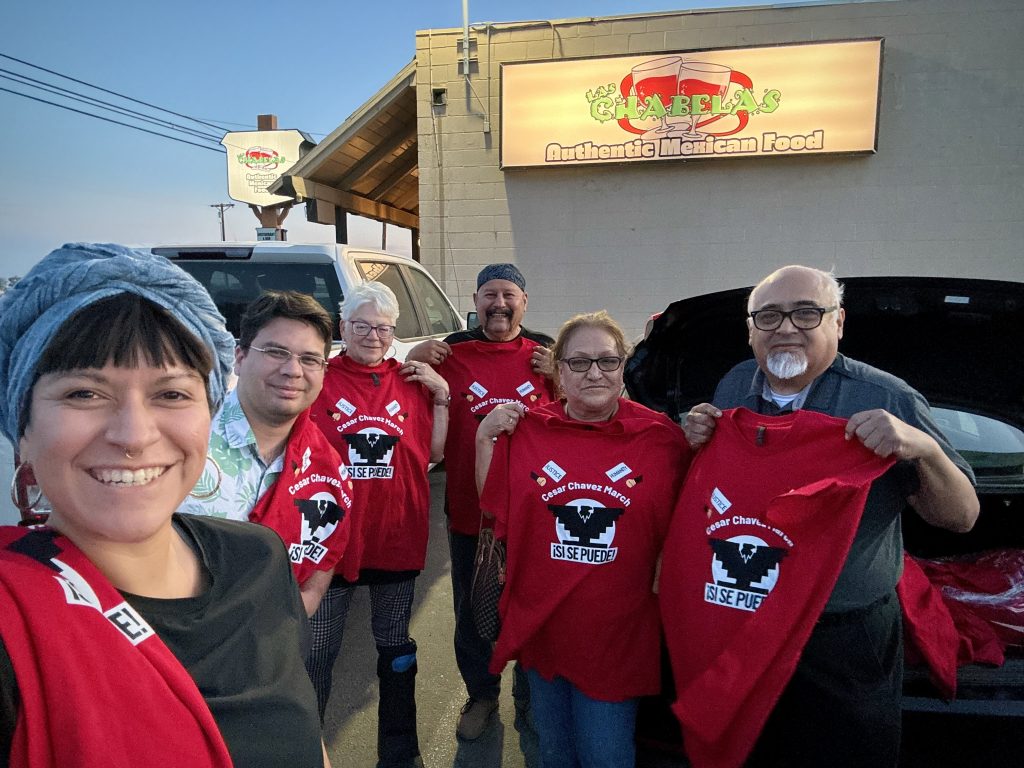
We found our sizes, took a quick photo, and had a brief conversation with a man wearing a black bandana named Julio. He mentioned to Justin and I that he had an amazing story about something that had happened while he was on the job as a fieldworker during the 1960s labor movement. Something about an impromptu James Brown concert in a barn somewhere. It sounded really cool, so I asked him to submit his story to us so we could preserve it for future generations. Knowing that some of our elders aren’t the best with technology (myself included) I told him that People’s Press also accepts handwritten letters, and that I personally edit each and every story so that minor mistakes with grammar and structure don’t overshadow the overall meaning. He seemed interested and we shook hands knowing we would run into each other again at the Chávez march. Sometime between then and event day, he actually did submit a handwritten story on ordinary lined paper and I lost my shit. This is what People’s Press was about, and it was only the beginning.
You can read Julio’s story here.
***
The day had finally arrived. This particular Saturday was completely jam packed, with three events running back to back including my tía’s 80th birthday party at my cousin’s house in El Centro. I woke up, ran a few errands, laid out a strappy green spring dress, trimmed my sideburns and straightened my bangs as best I could (I didn’t have time to see a barber for a proper taper), hopped in the car and got to it. There would be two more wardrobe changes before the day was over, and I was looking forward to it.
I walked in and started doling out hugs like I was Oprah giving away freebies in the early 2000s. Everything was lovely, from the snack bar and floral cake to the familiar faces and heartfelt speeches. Now that everyone is so much older, these kinds of gatherings don’t happen as often. I make sure to attend whenever possible and cherish each sound, smell, taste, and embrace like it might be my last.
Right then, a mariachi band burst on scene marching in from the side gate while playing Las Mañanitas (of course). Older family members joined in the song, and the rest of us became paparazzi. It was sweet, and the guest of honor was in tears. Mariachi music has that effect on people, I think. Something about just hearing it makes us want to cry, even those of us that don’t fully understand the words. It feels like a yearning–

Be that a land, a home, a loved one, or a time that feels ever present, but just out of reach. All the tragedies and triumphs of our ancestors are encoded in our souls, and it is what has kept our people alive even through the darkest of times. The unspoken memories and unthinkable pain of our elders ring true in these moments, and the presence of family is the ultimate testimony as to why, despite it all, that suffering was worth it.
One day, after I’ve won a Pulitzer Prize and revolutionized the job market, maybe I’ll get to fulfill my lifelong dream of singing in a mariachi band. For now, I’ll just admire those dope-ass trajes and belt out “y volver, volveerr vooolveeerrrr” from the sidelines.
***
I left the backyard bash a little early, and raced home with just enough time to get to the march. The all-day event had actually started earlier, but the memorial walk from Hinojosa park on the East side to the Plaza on Main Street was most important. I put on some straight leg blue denim cargo jeans, tucked in my UFW t-shirt, and added a killer combo of black boots with a matching belt and a flat brimmed felt hat to really set it off. There was something nostalgic about the look, even though my jeans were from Ross and the hat was from Forever 21 (back when I was actually 21). It felt practical, and comfortable. It felt appropriate.
I texted Justin who was already at the event roaming around, and I headed over to a group of marchers huddled at the gazebo closest to César Chávez Street. I walked past a few guys playing horseshoes while listening to ranchera music and a couple of stray dogs with collars–hallmarks of the barrio. I saw people carrying UFW banners and hand painted signs, as well as various flags representing American, Mexican, and Filipino heritage. There were folklórico dancers, a large group of IVC students, and a young boy dressed as César Chávez, salt and pepper hair y todo.
It was warm that day, and I think we were all thankful for the slight breeze. When the time came, CCMC leader Max Reyes directed the group to close in and join hands as a designated member of the committee began reciting the Prayer of the Farm Workers’ Struggle, the famous words written by César Chávez himself. Now, I’m not here to say everyone has to believe the same way, but it was kind of disrespectful to hear chatting going on during this part. I even saw a few people separate from the group and start taking photos of themselves and their kids posing with UFW signage. Personally, I’m okay if you want to document the process for social media and all, but doing so in that specific way kind of cheapened the meaning of it.
This is a problem with memorial walks and protests these days. Or anything political, rather. It sucks to say that some people only attend these kinds of things to give off the impression they care more than they really do. And that has never sat right with me. As the Jesus-loving Taoist-leaning mystic that I am, I believe it’s the good deeds that go undocumented that truly speak volumes about character. Like, if you’re gonna do the thing, do it for real.
Max said a few words about the plight of our people and how far we’ve come as a truckload of Filipinos pulled up fashionably late with more flags in tow. He reminded us of the conditions many farm workers had to endure prior to the labor movement, and why it’s important to continue honoring this tradition. “It was really a struggle. We just wanted basic human rights,” he said.
What I heard in the audiobook I had started seemed to line up with what Max and others were saying. Conditions were dismal and general treatment of workers was obviously subpar. There were no bathrooms and only limited drinking water was provided to share amongst many workers. No paid time off or sick pay, in addition to already low wages. Casual encounters with higher ups included random strip searches and unwarranted beatings, as well as a systematic silencing of those who dared to speak out. The growers and the police force were allies, the book confirmed, which only compounded the injustice.
I think it’s also important to note the role of the Church during those years. The support of the Catholic Church was critical in particular, with the National Conference of Catholic Bishops forming a committee in 1969 to advocate for farmworkers. This marked a sharp turn away from the neutral position of the past and challenged other religious leaders to make a clear decision as well. Protestant clergy and Jewish rabbis soon joined the ranks as the community eventually realized that…

Back at Hinojosa park, Mini Chávez took his place at the front of the group in all his four foot tall glory, proudly wielding a red and black HUELGA sign next to another young boy holding a framed illustration of the Virgin Mary. Two people holding the UFW banner faced César Chávez Street and the marchers gathered behind. The water tower, a symbol embedded in everyday life for residents of Brawley’s East side, stood tall in the background. Having served as a local landmark since its construction in 1935, it is set to be demolished for safety reasons later this year and marks the end of an era. The social, political, and economic paradigms our parents, tías, tíos, and grandparents knew and navigated is soon to be no longer.
As we prepared to march, the feeling of tradition was juxtaposed by the overarching sense that the future we are now faced with is riddled with human rights violations still unknown. Political upheaval along the Mexican-American border and in countries all around the world, along with relentless technological advancements in AI and strategic wealth consolidation amongst the elite then begs the question: What does it mean to be human, and shouldn’t we be racing to get real clear on that?
Vaya con Dios, they say. And we do. Just as they did before us.
“Your ancestors are beneath your feet,” said one of the last speakers. “Don’t forget you are standing on their shoulders.”
The march kicked off with a few scattered “Vivas!” and “Sí se puedes!”, but overall and despite a large group of youth, the chants were missing a bit of gusto in my opinion. Maybe it’s because, deep down, the kids know that marching in the streets ultimately isn’t going to bring real change. Or maybe they weren’t able to get free tacos after all, I don’t know. But the spirit of community held strong nonetheless, as people of all races, ages, and abilities walked along in solidarity down Main Street and across the railroad tracks that have divided the haves and have-nots of Brawley for generations.
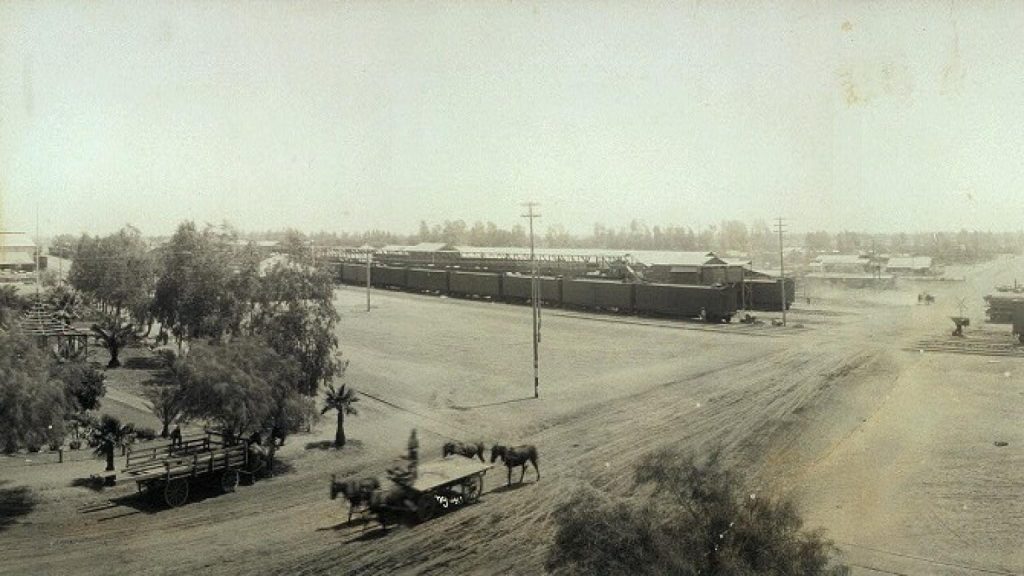
Source: brawley-ca.gov
The group was unmistakable, a sea of red sweeping through town in broad daylight being trailed by a rainbow of folklórico dancers. De Colores, indeed.
“Mexicanos, Filipinos, primos hermanos!” someone shouted as I jogged along the procession taking video like a guerilla warrior. As time went on, the chants got louder as we all remembered how to properly use our outside voice. The honking horns cheering us on along the way definitely gave marchers a confidence boost as well.
“Man, I sound like my dad,” said a gentleman carrying an old photo of his father as a fieldworker after chanting “Si se puede!” a few times. I smiled thinking of all the times I’ve said that about myself. It’s silly to think that we can completely escape the reality of turning into our parents, as if we aren’t made from the very fiber of their being to begin with. Although, they might try to deny that. Their struggles inevitably become our struggles, but sometimes, we get to reap the benefits of battles we personally never had to fight. And therein lies the problem.
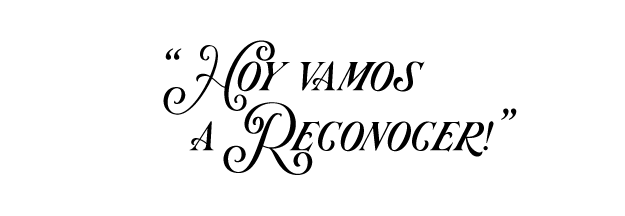
…said an older woman, cutting through the other more predictable phrases. It sounded like it came from a place of real sacrifice. Like maybe the pain she silently endured could be soothed in this moment just by being heard and acknowledged. And when it comes to language, it is not an exaggeration to say that the shame older generations felt around speaking Spanish and the physical punishment inflicted upon them for doing so, caused subsequent generations not only to be cut off from each other, but also effectively severed from self. Where did we come from? Who are we really? And… Where are we going?
Suddenly, I noticed the Plaza in sight. I tucked my phone into one of my many pockets (so useful), clipped my carabiner of color coded keys onto my belt loop, and high-tailed it to the stage with a hand on my hat. That makes me sound like such a main character, my goodness.
I arrived a little winded since my cross country star days are long behind me, and was immediately flagged down by Isabel Solís, an organizer for Los Amigos de La Comunidad and partner to CCMC leader Eric Reyes. She was livestreaming the event and unable to move from her post. She hastily told me that so-and-so couldn’t be found, and that someone needed to get on the mic to rally the marchers. I looked around–I was the only person in a UFW shirt for at least a quarter mile.
“Shit,” I thought, “I guess it’s me.” The girl who was always too afraid to raise her hand in class even when she knew the answer. Isabel gestured to the DJ, so I ran up and snagged the mic, mildly shocked I had come this far. He gave me my cue to speak. “Isabel, what do I say?” I mouthed wide-eyed in her direction. Without skipping a beat, she said, “Say ‘sí se puede!’” And I was like, omg of course.
At the last second, I thought this might be a pretty cool moment to record. Not to parade around online, but to add to this documentary I’ve been filming for the past few years. I whipped out my phone, turned the front facing camera on, and leaned it on the mixer at about waist level. This particular angle cut my face out of frame, but I thought it was better that way. This moment wasn’t about me, it was about us. So I left it.
I embraced a small wave of anxiety, brought the mic into place, and shouted, “Sí, se puede! Sí, se puede! Sí, se puede!” over and over until it occurred to me that I too sounded like my father. With a warm tone of encouragement and a fire in my belly. It was healing, in a way. To say those words, and to feel his spirit radiating from within me. Sometimes I wonder if he knows that. That no matter how fractured the family is, we are never far apart. Saying those words with conviction in front of an audience and hearing chants from the group get louder and more unified as they grew closer was kind of a big deal for me. Usually, I prefer to work in the background. But perhaps I’ve come to a point in my life where it’s time to step out for the world to see who I really am.
After a couple of incredibly long minutes, someone came by and relieved me of my duty. I reached down to stop the recording and realized… I never actually pressed start. Proof of that milestone moment ever happening was now nonexistent. And you know what, I didn’t really care. It would’ve been cool, but it wasn’t everything to me. It happened, and I was there for it. Perhaps in some recording somewhere, my voice can be heard off in the distance. My presence, a sound wave. The symphony of spacetime, ephemeral.
I laughed at my ability to philosophize just about anything (also a trait from my dad), and thought to myself, “You know, it’s almost like when God told Gil Scott-Heron…
…She meant it.” As an artist myself, I can confirm that is how it works.
The marchers assembled in front of the stage and Max gave a short speech addressing the community. “Some of us know we’re on our last legs”, he said, referencing OG members’ old age and deteriorating health. “The youth must choose to continue this legacy.”
The march officially ended but performances were set to continue on into the night. I shook hands with organizers and filmed a little B-roll before heading home to change for the next event (a local artist showcase hosted by the Dream Center happening simultaneously). I ran into local resident and president of the Brawley Senior Citizens Club, John Hernandez, chatting it up with Filipino representative and political activist, Johnny Itliong. As soon as John and I made eye contact, I knew I was in for a lengthy conversation.
I’ve interviewed John on a few occasions since he’s a very outspoken member of the community and has seen it evolve over the years, and I learn something new every time.
He said hello and then followed it up with something in Spanish, to which I hesitated to answer. I tried my best to recall what I learned in Spanish 2 with Mrs. Peña, but took too long to conjugate a verb so he jumped in with, “What, no hablas Español?” Sheepishly I said, “I don’t, I know,” to which he smirked and shook his head. Not in a hateful way, but in the way I expected. I told him I wanted to refine the skill someday, but for now I’m much more comfortable in English. And that is true, but I lowkey don’t consider Spanish our native tongue anyways.
The conversation went on, and we touched on a few topics. He mentioned the state of the city, and how marching down Main Street earlier really demonstrated how bad things have gotten. “All this blight everywhere, it’s not a good look,” he said, referencing the crumbling roads, vacant buildings, and boarded up businesses. Thinking that perhaps he misspoke, I said, “Did you mean plight?” He assured me he meant blight. “Look it up,” he said. I did, and he was right.
“Blight” in the English Dictionary refers to “a thing that spoils or damages something”. And it did seem that certain parts of the city had been left to rot. A lot more on the east side of the tracks than west of it. And I do give the City the benefit of the doubt, at least present day, because I know how hard City staff try and I’m aware of the broader financial decline that has affected the working class on both a local and global scale. And while John was perhaps saying this in comparison to a time when our downtown was in better health, I couldn’t help but see something else at work.
Every fifty feet or so, I noticed we would march past large orange road signs that read either “detour ahead” or “road work ahead”, and I couldn’t help but think about how that kind of sums it all up.
We are here to continue what our elders started. To keep the original fire burning to bring warmth, hope, and ultimately justice to those that don’t have the privilege to be seen and still be safe. Dear Reader, if you’ve made it this far, the torch is being passed to you.

To build something better. A world that’s more loving. A system that favors equity, nurtures life, and values individuality while remaining in balance with the collective. What we see in front of us is not the end.
***
I found myself without plans this 4th of July, and that was perfectly okay with me. I’m not really much for blowing my money on overpriced explosives and calling it patriotic. But hey, they are pretty. And ultimately, I’m thankful for the rights and opportunities I have as an American citizen and I realize in many ways, I live the life that someone who came before me could only dream of. I am the reason they fought so hard. I am the reason someone chose to live and not die, even when it seemed all hope was lost.
At sunset, I found myself restless from writing all day and headed over to Jefferey Thorton park on the West side of town. I walked to the center of the grass, took off my shoes, and sat down. It’s so important that we make time to literally “go touch grass” in this technologically dystopian chapter of the evolution of human consciousness. To connect with God, the organic world around us, and the cellular memory that holds the keys to our highest timeline.
With my bare feet on the ground, I tapped into the land and felt her pain. The thought of slicing up Mother Earth and divvying up her body to the highest bidder or most violent agent is not only heinous, but also laughably futile. To think that a nation owns any part of her, and therefore has the right to abuse and murder many life forms to defend imaginary lines in the sand is, unsurprisingly, a losing game. Just what exactly did we think was going to happen?
The evening air was thick with anxiety (or maybe I was just too close to the 5G tower) and the setting sun brought with it an invitation for residents to ramp up their pyrotechnic displays. I, however, was trained on the swath of dandelions I found myself sitting in. It reminded me of one of the worst depressive episodes I ever endured shortly after graduating college at the end of 2017. It was like I had all this knowledge, all this potential, and a burning passion to be a force for Good in the world–but nowhere Real to put it. Thinking back on those days, and how hard it was to exist minute to minute, I know there’s truth behind the saying “what doesn’t kill you makes you stronger”. And to think, if we really are emanations of our ancestors, keepers of the original spark of Creation that honors the highest order of All Things, tell me… who then can stop what is already written in the cosmos?
Here in the Valley, the overarching feeling of growing up between lands, being born into a new millennia of shifting paradigms, and having an identity about as reliable as the available funds in my bank account, boils down into something that resembles the phrase “ni de aquí, ni de allá” –
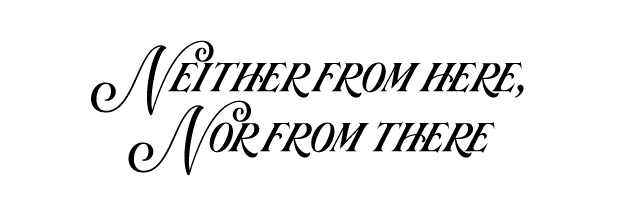
And perhaps this was inflicted upon our people intentionally. That understanding our identity is key to understanding our purpose, and if we don’t have one we might never fully realize the other. In this day and age, identity politics operate in place of real community, an array of gender pronouns offers the illusion of choice, and some factions of modern science seek to destroy the soul altogether. But if we stand in solidarity and speak, without forgetting to listen, there is no telling just how beautiful the New Earth we build will be.
If you believe you can decide who you are, rather than remember, I challenge you to zoom out from the perspective of this one life. We don’t exist within a vacuum. We are more than Latino. More than Mexican-American, or either nationality on its own. We are more than the Hispanic category we mark on the census, knowing damn well the shoe doesn’t quite fit; more than our tax bracket or our zip code. We are more than our family name, who we love, or what we’ve been through. We are beings indigenous to this planet, and I suggest we return to what’s Real with intention. The answers to what we seek, what we long for and dream of, were always right here. Sat silently amongst the dandelions, waiting for us to tap in; not on an app, website, or infographic somewhere.
At the end of the day, we go to school, drive to work, eat and shop on the very same lands that held and nourished our ancestors. And the people who work the closest with it, those with the most intimate understanding of her seasons, habits, and abundant potential, are tossed to the wayside like expendables. As if the knowledge and skill they possess is not sacred. And we as descendants of this very human, very divine legacy carry a connection to the land whether we’ve worked in the fields or not.
In indigenous traditions of North America (ultimately our own), dandelions represent resilience and community. They are important to the ecosystem, and to humans directly as superfoods and in the form of medicinal teas and tinctures. What some consider a weed is actually an example of a successful strategy. Dandelions are steadfast, hard to eradicate, and demonstrate the value of making it work wherever you are. Kind of like us.
I guess you could say…
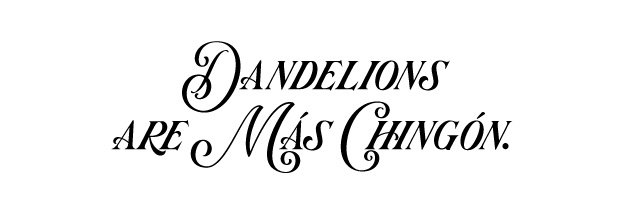
Legs crossed, I took a deep breath in and tried to shake off the mixed feelings that had enveloped this holiday more than most. As I exhaled, I whispered to myself “I am safe” and before I could reach the end of my breath, someone launched one of those bomb-like illegal fireworks sky high. Immediately, my body tensed up. I wasn’t expecting it. The trauma of my ancestors being literally hunted on our own land, ripped away from our families and kicked out of generational homes, still lives in my body even on days that don’t feature fireworks. The realization was sobering. I can only imagine that existing in a constant state of fight-or-flight is a way of life for many farmworkers, undocumented immigrants in general, and so many others caught up in border politics worldwide. But together, La Raza always find a way.
Like dandelions, some people may be allergic to our presence, but that doesn’t mean we’re going anywhere. We will stay connected to our familia and our land like our lives depend on it, because we know they do. Hermana, Hermano, keep breathing like the rebel that you are. Do not let others trample your eternal spirit, pay no mind to the mainstream media if at all possible, and sure as hell do not let the powers at be write our stories for us.
Want to support Citizen Journalists like Sarina?
☕️ Buy Sarina a coffee! 😊

